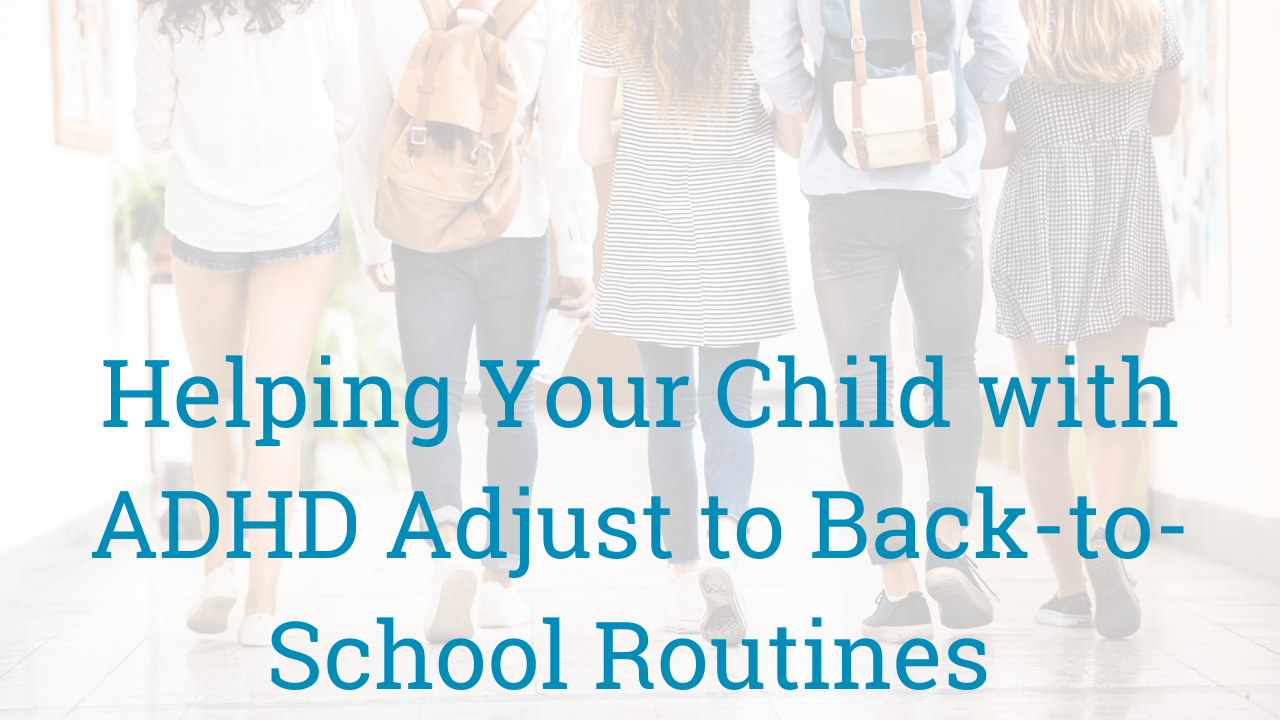
Helping Your Child with ADHD Adjust to Back-to-School Routines
By now, the initial excitement of the new school year has worn off, and some children with ADHD may start struggling to keep up with their routines.
If your child is having a hard time adjusting, it’s not too late to implement strategies that can help them get back on track.
Here’s how you can support your child’s adjustment and ensure they have a successful school year, courtesy of the NextStep4ADHD team.
1. Revisit and Reinforce the Daily Routine
If your child is having trouble sticking to their school routine, revisit and reinforce your daily routine and schedule with them. Consistent morning, after-school, and bedtime routines help create a sense of stability, which can reduce anxiety and make daily transitions smoother.
If mornings are rushed, for example, preparing clothes and school bags the night before can alleviate stress. Make small adjustments as needed to help your child feel more in control of their day.
2. Use Visual Aids to Stay Organized
Visual aids are powerful tools for helping children with ADHD stay organized. A visual schedule or calendar that outlines school activities, homework times, and extracurriculars can help your child anticipate what’s next and reduce overwhelm.
Consider color-coding different subjects or activities to make the schedule more engaging. Daily checklists can also help your child track their tasks and responsibilities and help provide a sense of accomplishment as they complete each one.
3. Set Short-Term Goals
Children with ADHD often respond well to short-term goals that are more manageable and less overwhelming than long-term objectives. Break down larger tasks into smaller goals that your child can achieve daily or weekly.
Celebrate these small successes to keep them motivated. For instance, you could set a goal for your child to complete their homework on time for a week, and reward them with a special treat or privilege.
Learn more about SMART Goals here.
4. Review Homework and Study Habits
If your child is struggling with homework or study sessions, it’s time to review their habits. Ensure they have a quiet, distraction-free space for doing homework, and establish a regular routine that includes short breaks to prevent fatigue. Learn more about setting up a homework space here.
If they find large assignments overwhelming, break them into smaller, more manageable parts, and use a timer to help them stay focused on each task.
5. Know the Warning Signs That ADHD Isn’t Well-Managed
As the school year progresses, it’s important to stay alert to signs that your child’s ADHD may not be well-managed. Even before issues pop up, familiarize yourself with the warning signs.
Some red flags include:
- Difficulty Staying Focused: If your child is consistently unable to concentrate on tasks or follow through with instructions, it may indicate that their ADHD symptoms are interfering with their schoolwork.
- Increased Frustration or Irritability: Frequent emotional outbursts, frustration, or irritability can be signs that your child is feeling overwhelmed and unable to cope with the demands of school.
- Declining Academic Performance: If your child’s grades are dropping or they’re receiving negative feedback from teachers, it might be a sign that their ADHD symptoms are impacting their ability to learn and perform in school.
- Avoidance of Schoolwork: A sudden reluctance to go to school, complete homework, or participate in class could indicate that your child is struggling with more than they can manage.
If you notice these warning signs, it may be time to revisit your child’s ADHD management plan. Consulting with their Next Step 4 ADHD care team can help you make necessary adjustments to their treatment plan, whether it involves medication, therapy, or behavioral interventions.
6. Implement Positive Parenting Techniques
Positive parenting can be a game-changer in helping your child adjust to school routines. Focus on reinforcing good behavior with praise and rewards, setting clear expectations, and being consistent with consequences.
This approach not only helps your child feel supported but also encourages them to stay motivated and follow routines. For more insights on how positive parenting can benefit children with ADHD, visit Dr. Kristi Brisco’s expert advice.
7. Communicate with Teachers Regularly
Your child’s teachers have a close view of their daily behavior and academic performance, making regular communication with them crucial. Stay informed about your child’s progress, and share strategies that work well at home. This collaboration can help create a consistent support system both in the classroom and at home, ensuring that any issues are addressed promptly.
8. Encourage Social Interaction
Social interactions can be particularly challenging for children with ADHD, but they are essential for emotional well-being. Encourage your child to participate in social activities, both inside and outside of school.
If your child is struggling to connect with peers, consider arranging playdates or enrolling them in group activities where they can practice social skills in a structured environment.
Questions? We’re Here for You
Adjusting to back-to-school routines mid-year can be challenging for children with ADHD, but with the right strategies and support, your child can find their rhythm and succeed. By reinforcing routines, setting short-term goals, and staying vigilant for signs that their ADHD may not be well-managed, you can help your child navigate the school year with confidence. Your involvement and encouragement are key to helping your child thrive both academically and socially.
If you’d like to make an appointment, click here to get started.
Related Posts
What’s the Best Job for a Person with ADHD?
Approximately 4.4% of adults have ADHD. That's a whopping 8 million adults....
How to Tame Your Inner Critic
Living with ADHD often means battling an inner critic—a persistent voice that...


